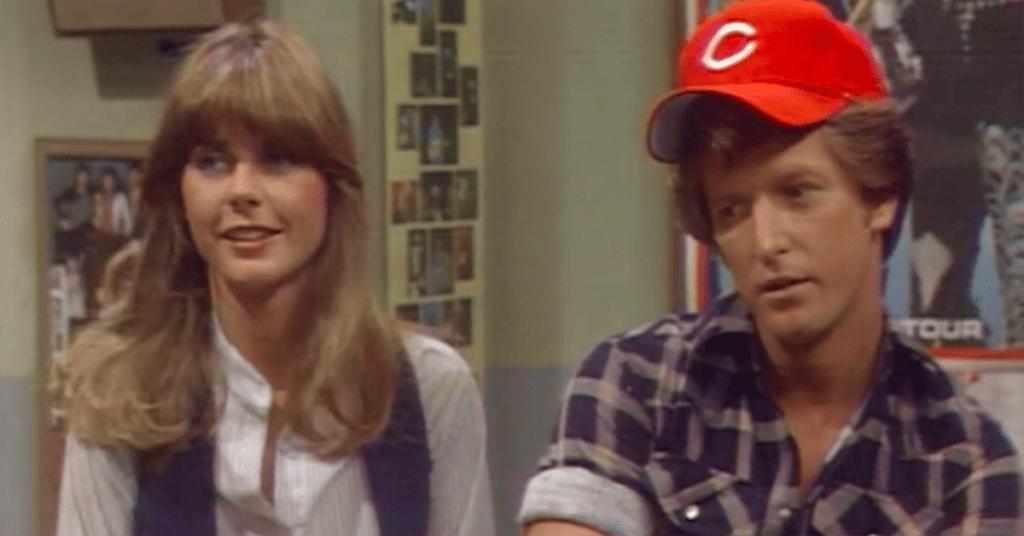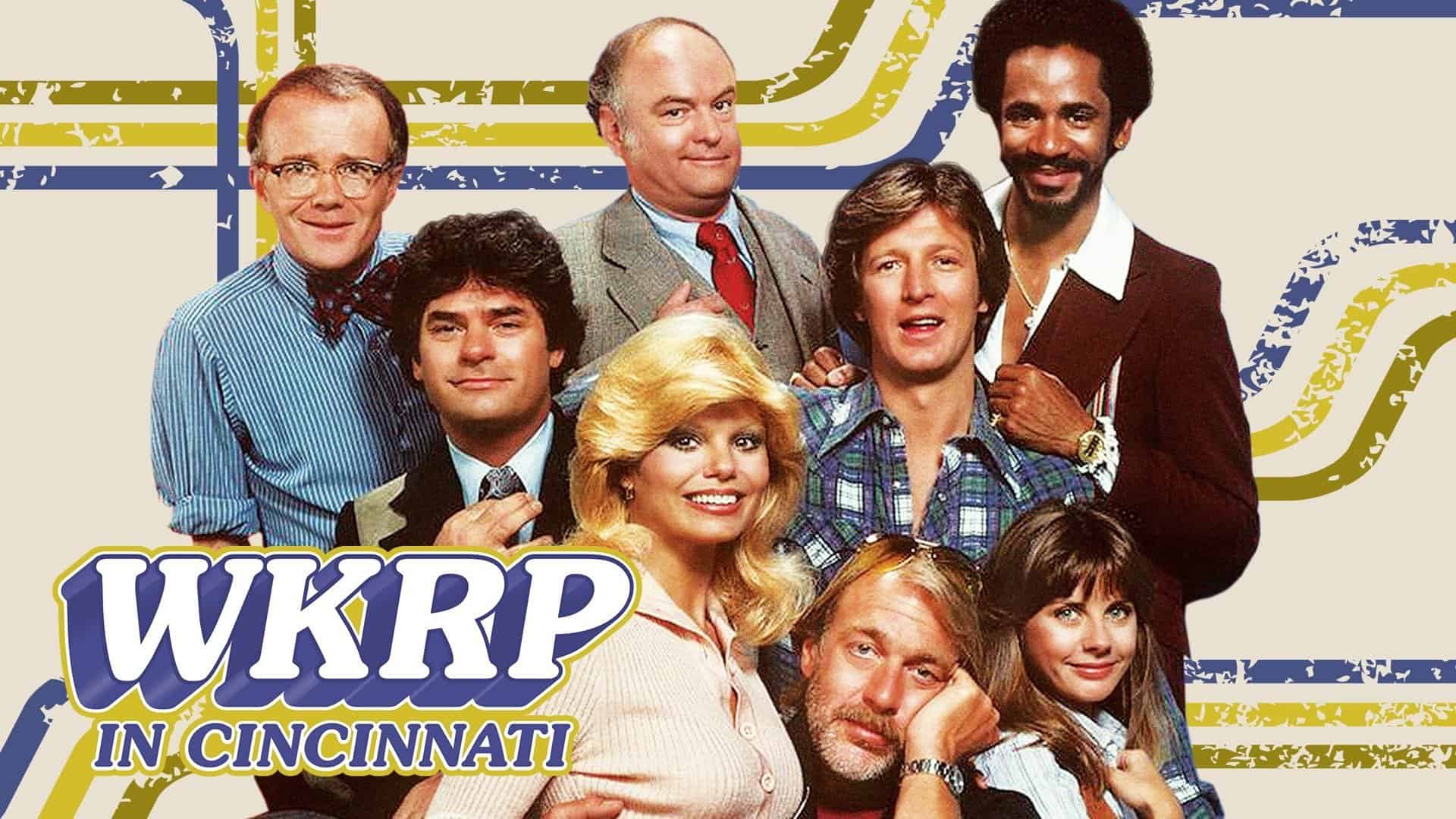WKRP in Cincinnati is an American sitcom that aired from 1978 to 1982. The show follows the misadventures of the staff at a struggling radio station in Cincinnati, Ohio. The series was created by Hugh Wilson and was loosely based on his experiences working in advertising sales at Top 40 radio station WQXI in Atlanta.
WKRP was a groundbreaking show known for its sharp writing, strong ensemble cast, and memorable characters. The show tackled various social and political issues, including censorship, drug use, and racism, and was one of the first sitcoms to feature a diverse cast of characters. The show also featured a number of memorable episodes, including “Turkeys Away,” in which station manager Arthur Carlson drops live turkeys out of a helicopter as a Thanksgiving promotion, with disastrous results.
FUN FACT: Hugh Wilson admitted to the Cincinnati Enquirer that he picked the call sign WKRP to stand for “c-r-a-p.”
Plot Summary
The show’s ensemble cast includes a variety of quirky characters, including the station’s morning DJ, Dr. Johnny Fever, who is a former rock-and-roll DJ with a drug history; the receptionist, Jennifer Marlowe, who is beautiful but not very bright; and the news director, Les Nessman, who is obsessed with his imaginary office walls.
Throughout the series, the WKRP team faces various challenges, including a disastrous Thanksgiving promotion involving live turkeys being dropped from a helicopter, a protest over a controversial song played on the air, and a tense contract negotiation with a popular DJ. Despite these challenges, the team always collaborates and keeps the station afloat.

Cast and Characters
“WKRP in Cincinnati” was a hit television sitcom that aired from 1978 to 1982. The show’s cast was made up of a talented group of actors who brought the characters to life in a unique and entertaining way.
Arthur Carlson (played by Gordon Jump) was the station’s general manager, a bumbling and well-meaning man who inherited the station from his father.
Andy Travis (played by Gary Sandy) was the program director who was brought in to turn around the struggling radio station. He was a calm and level-headed leader who was respected by his colleagues.
Dr. Johnny Fever (played beautifully by Howard Hesseman) was the station’s morning DJ with a rebellious streak. He was known for his wild on-air antics and his love of rock and roll music.
Venus Flytrap (played by Tim Reid) was the smooth-talking evening DJ who was a hit with the ladies. He was also a talented musician who performed on the show from time to time.
Herb Tarlek (played by Frank Bonner) was the station’s sales manager, always trying to develop new schemes to make money. He was known for his loud and colorful wardrobe.
Jennifer Marlowe (played by Loni Anderson) was WKRP’s whip-smart receptionist who did much more than answer the phones. Many think she was the brains behind the entire operation.
Bailey Quarters (played by Jan Smithers) was the station’s shy, sweet ingenue who worked her way up to a news reporter on the show.
Les Nessman (played by Richard Sanders) was the station’s news director known for his awkwardness and love of farm news. He was a lovable character who always seemed to be in over his head.
Production
WKRP was produced by MTM Enterprises, the same company that produced other hit shows like The Mary Tyler Moore Show and The Bob Newhart Show. Despite being set in Cincinnati, the show was filmed in Los Angeles due to the high cost of filming on location.
The show’s theme song, “WKRP in Cincinnati,” was written and performed by Tom Wells. The opening sequence featured shots of Cincinnati landmarks such as the Roebling Suspension Bridge and Fountain Square.
WKRP was known for its use of rock and roll music, which was unusual for a sitcom at the time. The show’s music supervisor, Tom Wells, worked with record labels to secure the rights to use popular songs on the show. The show also featured live performances by musicians like Blondie and The Cars.
The show’s first season received mixed reviews and struggled in the ratings. However, it gained a following in its second season and continued to be popular until its cancellation after four seasons in 1982. The show’s legacy lives on through syndication and DVD releases, and it remains a beloved classic among fans of sitcoms and classic rock music.

Broadcast and Reception
WKRP in Cincinnati premiered on CBS on September 18, 1978, and ran for four seasons until April 21, 1982. The show was initially scheduled to air on Monday nights at 8 pm, but it was moved to a different time slot several times during its run, which affected its ratings. Not to mention the extremely tough Monday night 8 pm time slot competition, Little House on the Prairie aired on NBC, and Welcome Back, Kotter shared the same timeslot on ABC.
Despite its popularity with audiences, WKRP in Cincinnati was not without controversy. Some radio industry professionals criticized the show’s depiction of rock music and radio station culture as unrealistic and exaggerated. Additionally, some viewers were offended by the show’s use of adult humor and occasional drug references.
However, despite these criticisms, WKRP in Cincinnati remains a beloved cult classic among fans of classic television. It has been released on DVD and is available for streaming on various platforms, ensuring that new generations of viewers can discover and enjoy the show.
Legacy and Influence
WKRP in Cincinnati’s legacy is significant for its place in television history and its impact on the music industry. The show’s use of rock music as a storytelling device was groundbreaking and helped to popularize many songs and artists. It also helped establish a new format for radio stations, Album-Oriented Rock (AOR), which focused on playing full albums rather than just singles.
The show’s satirical take on the radio industry and its characters’ antics influenced many other television shows, including The Office and Parks and Recreation. It also inspired a number of spin-offs, including a short-lived sequel series called The New WKRP in Cincinnati, which aired in 1991.
WKRP in Cincinnati has continued to be popular in syndication and has gained a new generation of fans through streaming services. Its impact on popular culture and the music industry is undeniable, and its influence can still be seen in how music is used in television and film today.

